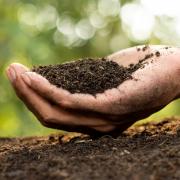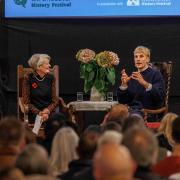As winter settles across the Cotswolds and gardens prepare for their seasonal rest, there’s a hidden opportunity lying right in your kitchen waste. Every bit of organic material is a potential treasure for your garden’s ecosystem.
‘Soil is exciting – it’s not just mud, it’s a living resource,’ explains Stuart Ritchie, environmental education manager at Earth Trust. ‘There are billions of living organisms in just a teaspoon of soil, and they’re critical to our survival.’
Transforming winter waste into garden nutrition
The winter months offer a perfect opportunity to embrace composting. Whether it’s leftover vegetables, fallen leaves, or garden trimmings, organic waste can be transformed into rich, nourishing soil.
‘Composting is all about balance,’ Stuart shares. ‘You’re looking for a mix of green materials high in nitrogen – like fresh garden clippings – and brown materials rich in carbon, such as dry autumn leaves or cardboard tubes. The key is creating the right environment for decomposition.’
More than just waste management
Composting isn’t just about disposing of kitchen scraps; it’s about nurturing an entire ecosystem. Healthy soils play a crucial role in climate regulation, storing carbon and preventing flooding by absorbing excess rainfall. ‘Soils are the foundation that supports all land biodiversity,’ Stuart emphasises.
Top composting tips
• Balance green (nitrogen-rich) and brown (carbon-rich) materials
• Keep your compost heap moist
• Avoid cooked foods that might attract vermin
• Chop larger items to speed decomposition
A word of caution
Not everything belongs in your compost bin. ‘To avoid attracting rats, stick to uncooked vegetable scraps,’ Stuart warns. ‘Cooked vegetables, meat, cheese, and bread are off-limits.’
The bigger picture
For Stuart, composting is more than a gardening technique – it’s a commitment to sustainability. ‘Adding organic matter to your garden is the best thing you can do,’ he says. ‘It feeds the ecosystem and nourishes your plants, preparing them for the coming spring.’
This winter, look at your kitchen and garden waste with new eyes. Each leftover vegetable, fallen leaf, and garden trimming is an opportunity to create nutrient-rich compost and contribute to the vibrant, living world beneath our feet.
Stuart Ritchie is the environmental education manager at Earth Trust, a charity dedicated to connecting people with nature and championing green spaces in Oxfordshire and beyond.





























